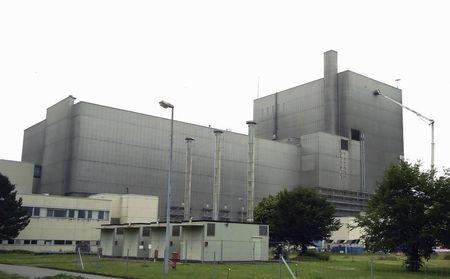FRANKFURT/BERLIN - When Chancellor Angela Merkel called up the boss of Germany's biggest power producer RWE two days after the first explosion at Japan's Fukushima nuclear plant, there was no mention of a u-turn in her energy policy.
Twenty-four hours later, Juergen Grossmann learnt through the media that Merkel was planning to shut down the country's oldest nuclear plants and bid farewell to a technology she had vowed was critical just six months earlier.
"There was great hysteria," Grossmann, RWE's CEO until 2012, said during a hearing at the state of Hesse parliament this year.
"The government thought at the time that Germany was close to a nuclear disaster," said Grossmann, 63, known to his critics as "nuclear Rambo", according to transcripts of the hearing seen by Reuters.
The decision, one of the biggest policy turnarounds in Germany's history, lays bare a lack of coordination untypical for Merkel, a physicist by training and known for her disciplined step-by-step approach.
Half a decade on, it shows.
As the Fukushima disaster approaches its fifth anniversary, Germany's utilities are in crisis and struggling to shoulder the shutdown bill. There are fears the government may have to bail them out.
Germany is already facing billions of euros in costs related to the influx of thousands of refugees, an emissions scandal at Volkswagen and multiple bailouts for its banks.
The main problem is the lack of planning in how to tackle the up to 80 billion euros ($88 billion) cost of decommissioning Germany's atomic reactors.
"This should have been tackled much earlier," said Claudia Kemfert at Berlin-based DIW economic institute. "Together with the decision to phase out nuclear power they should have found a way or come up with some legislation to deal with the cost. The cost is not a new thing."
On top of those costs, there is the more than 20 billion euros annually to expand solar and wind power to help fill the energy gap.
'Giant icebergs'
It has left a utility industry struggling to find a new business model.
"It was definitely not thought through," said Tilman Mayer, a political science professor at the University of Bonn, adding not even Japan had decided to fully abandon nuclear plants.
"It was an isolated decision by the government, or more specifically by the Chancellor, which hasn't been imitated anywhere else in Europe."
Since Fukushima, shares in Germany's top three energy groups - E.ON, RWE and EnBW - have lost an average 56 percent, or 50 billion euros in combined market value, while racking up 65 billion euros in net debt, about twice their current combined market value.
They have filed lawsuits against the government, claiming more than 24 billion euros related to Merkel's nuclear policy, which they claim is unfair and has rid them of one of their main profit centres overnight.
Before the Fukushima crisis, German nuclear capacity was around 21,500 megawatts (MW). It is now 11,357 MW and will cease in 2022, when the last of the reactors will be shut down.
Germany's nuclear capacity now only accounts for about 6 percent of the country's total capacity. But it provides crucial round the clock supply, which is difficult to plug with intermittent solar and wind power.
Government officials counter that all four big utilities have brought the pain on themselves by failing to adjust their business models quickly enough to respond.
"For a long time, the companies didn't take the phase-out seriously and said, 'there will be another government and then this racket will be over'," said Michael Mueller, co-head of the parliamentary committee on storing highly-radioactive nuclear waste.
"Basically they are enormous ships that are travelling through the Arctic Ocean knowing that there are giant icebergs there, but they keep on going."
Financial prop
The conflict highlights the relationship between Berlin and the utilities, which are required by law to provide electricity and whose business relies heavily on government regulation.
"The utility sector is a sector that doesn't work in private hands," said a former senior manager at one of Germany's biggest utilities, adding it would make sense to nationalise them in light of the current nuclear shutdown.
E.ON's predecessor companies were once state-owned, RWE is still partly held by local communities and EnBW is almost fully owned by the German state of Baden-Wuerttemberg and its communities.
There is no hint of privatisation, but a senior member of Merkel's government conceded last month that the German government may need to prop up RWE, Germany's second-biggest utility, by offering financial support.
"It's not a sign of political foresight if we take away RWE's business model and then let the whole group collapse," Armin Laschet, deputy chairman of the Christian Democratic Union (CDU), told the Westdeutsche Allgemeine Zeitung.
It would be difficult for Berlin to escape all responsibility, having encouraged and promoted the use of nuclear power during the oil crisis of the 1970s to diversify its energy supply.
"From the start, the German state and energy companies have shared the responsibility for nuclear energy," Johannes Teyssen, CEO of Germany's largest utility E.ON, said last month. "It was the state that wanted Germany to make peaceful use of nuclear energy."
As a result, the German Economy Ministry has formed a 19-member commission that is tasked with making recommendations on how to safeguard funding for the shutdown by the end of January, for example in a public trust fund, a move that industry sources say is the first step towards public aid.
For former RWE CEO Grossmann, this would not come as a surprise. "If you push through with political interests you also have to bear the consequences," he said.






















































